
Ever grappled with that persistent discomfort that blossoms from life’s non-stop pressures? The continuous demands of work, personal commitments, and the world around us can often spin our mental state into chronic stress. But what if nature holds a secret weapon for adapting to this ceaseless tension hidden in the strength of certain plants? Plants that don’t just survive but robustly thrive in the most challenging environments. Here, we uncover Adaptogens! These ancient herbs have been revered for centuries, believed to channel their resilient energy directly to us humans. Once quite literally deemed ‘magic herbs,’ these adaptogens now stand as a testament to the science of nature. We all know that magic is simply misunderstood science, right? Dive in with us as we explore adaptogens, and you decide – is it magic or misunderstood science? Let’s embark on this journey together.
What are Adaptogens?
Suppose you’ve heard whispers around the water cooler about Ginseng or maybe seen Ashwagandha making a guest appearance in health ads, or even heard a girl at work raving about some trendy new wellness gummies. In that case, chances are you’ve already had an encounter with the buzzword ‘Adaptogens.’ But what are they, precisely? The name might give away a hint – these are nature’s very own stress fighters, designed to help your body adapt. Let’s delve into this world of resilience and balance and uncover the science behind these so-called ‘magical’ herbs. But be warned, once you discover the power of Adaptogens, there might be no going back. Ready to get enlightened? Let’s dive in.
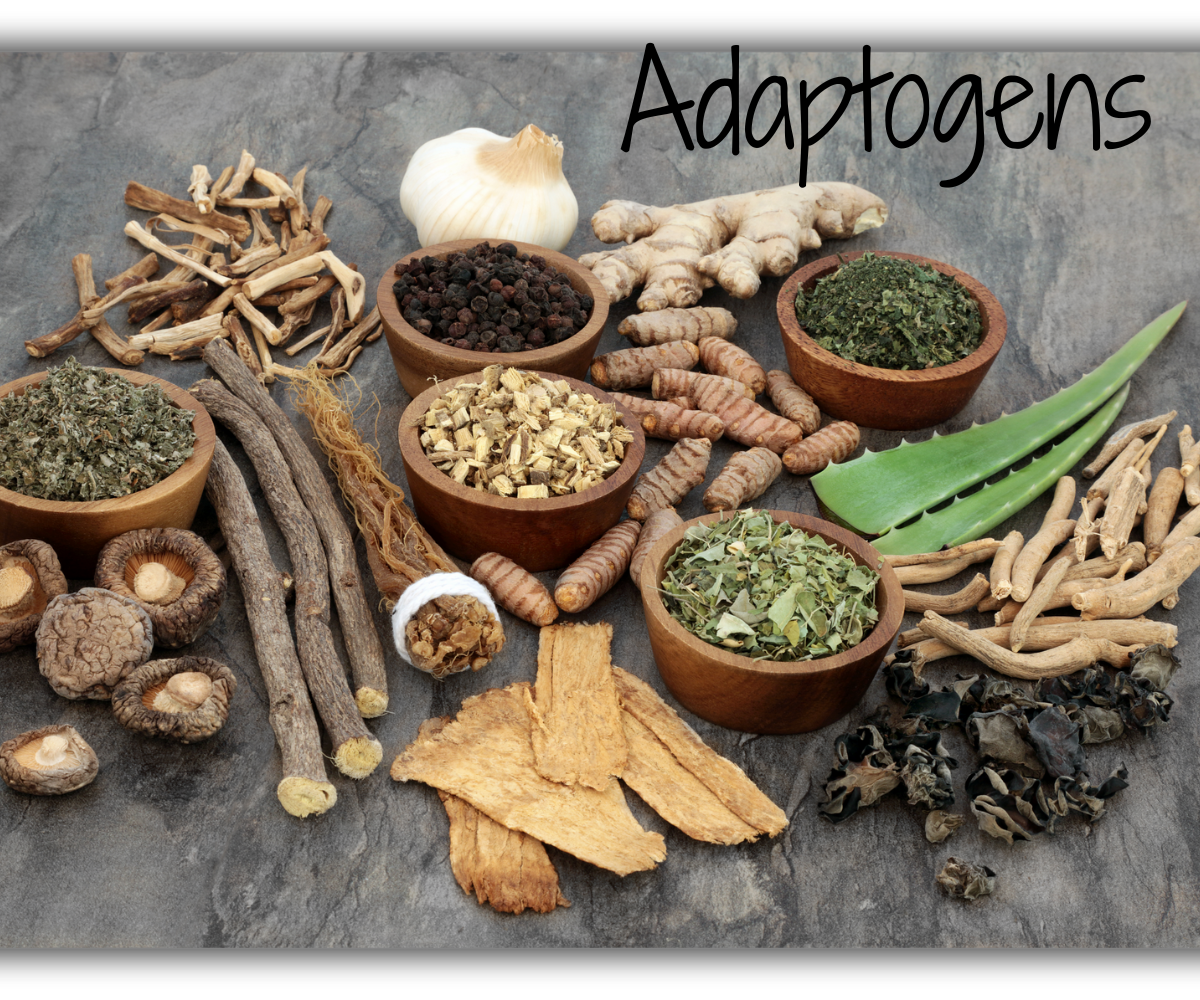
Adaptogens By Definition
Adaptogens are a category of herbs and mushrooms that help balance your body’s reaction to stress by modulating its hormonal and physiological functions. They work by “adapting” their function to your body’s specific needs. Whether it’s stress from work, a significant life change, or just day-to-day worries, adaptogens help your body cope with external pressures, keeping it in equilibrium. This is why they are named “adaptogens” – they help the body to “adapt.” Their effects are non-specific, and they should cause minimal side effects.
A Brief History of Adaptogens: An Age-Old Secret Now Unveiled
“Adaptogen” may sound like a new-age term, but its roots dig deep into our ancient past. These mysterious plants have been used for millennia, from the high-ranking nobles of ancient China to the vigorous Vikings of Scandinavia, all leveraging the unique powers of certain adaptogens themselves. Yet, it wasn’t until the 1940s that we officially recognized their special qualities and gave them a name.
Long before the advent of modern medicine, our ancestors had already tapped into nature’s pharmacy. They discovered certain herbs had the unique ability to enhance the body’s resistance to stress, fatigue, and disease. This understanding was first codified in the traditional healing practices of China and India, with herbs like ginseng and ashwagandha being lauded for their restorative properties.

The Shennong Ben Cao the oldest writing of ginseng and 252 different ancient herbs dating back to 220AD
In ancient China, these herbs were often reserved for royalty – seen as a divine elixir that provided strength, longevity, and a sharpened mind. Simultaneously, in India’s Ayurvedic practices, adaptogens were used as rejuvenating herbs that maintained youth and sustained vigor.

Fast forward to the time of the Vikings, those seafaring warriors known for their strength and endurance. It’s said they consumed adaptogens to prepare for their strenuous voyages and intense battles. The adaptogens boosted their stamina, resilience, and mental clarity during these arduous journeys and conquests.

The term “adaptogen” was first coined in 1947 by a Russian scientist, Nikolai Lazarev, who was researching substances that could enhance the body’s resistance to stress. His work was continued by Dr. Israel Brekhman, who established the criteria for adaptogens: They should be non-toxic, produce a non-specific response, and help to create a state of balance in the body.
Since then, countless scientific studies have backed up the age-old wisdom surrounding adaptogens, reaffirming their benefits for physical and mental health. They have been proven to support the adrenal glands, which respond to stress and regulate hormones, improve cognitive function, enhance energy and mood, and much more.
Before starting any nootropic supplement its always advised to make sure your getting enough Choline in your diet. Choline is an essential nutrient responsible for the production of acetylcholine which is the neurotransmitter responsible for memory and focus. To read more on this check out this article: Unleashing Brain Power: The Essential Role of Choline in Nootropics.
Understanding the Types of Adaptogens: A Closer Look
Adaptogens, nature’s secret to stress resilience, come in various forms. If you’re looking to delve into the world of adaptogens, it’s helpful to understand their different types. Here, we break down adaptogens into three main categories:
Plant or Herbal Adaptogens
This category is the most popular and widely used. It consists of adaptogens derived from plants and herbs, many of which have found their place in traditional medicinal practices around the world. Key examples include:
Ashwagandha
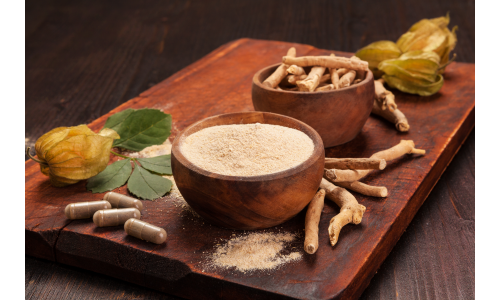
Ashwagandha, known scientifically as Withania somnifera, is a crucial plant in Ayurvedic medicine, one of the world’s oldest medicinal systems hailing from India. It has been used for over 3,000 years to boost energy, improve concentration, and combat stress. Its name translates to “smell of the horse,” which references its unique smell and the traditional belief that consuming it can impart the strength and vitality of a horse.
Throughout its long history, Ashwagandha has undergone numerous scientific studies affirming its efficacy as a nootropic adaptogen. A 2012 study published in the Indian Journal of Psychological Medicine showed Ashwagandha’s potential for stress reduction. The double-blind, randomized control trial included 64 subjects with chronic stress. They received either 300 mg of Ashwagandha root extract or a placebo twice daily for 60 days. The Ashwagandha group had significantly reduced stress-assessment scores compared to the placebo group, demonstrating its efficacy in stress management.
Here are some notable benefits of Ashwagandha:
Stress Reduction: Ashwagandha is perhaps best known for its ability to lower cortisol levels, the body’s primary stress hormone, thereby reducing the symptoms of chronic stress.
Boosts Cognitive Function: It has been found to improve memory, reaction time, and cognitive performance, making it a popular choice in nootropic stacks.
Promotes Balanced Mood: Regular use of Ashwagandha can help enhance mood, reduce anxiety, and promote overall mental wellbeing.
Enhances Physical Performance: Traditionally used to boost strength and vitality, some studies suggest it may improve muscle mass and endurance.
In essence, Ashwagandha is a time-tested adaptogen backed by modern science. It offers a natural way to manage stress, improve cognitive function, and boost physical performance.
For the full article on Ashwagandha, CLICK HERE!
Bacopa Monnieri

Also known as Brahmi, is a staple plant in Ayurveda, renowned for its cognitive-enhancing properties. With a history of use dating back at least 3,000 years, Bacopa has long been consumed to improve memory, enhance cognitive function, and promote a calm, focused mind.
Like Ashwagandha, Bacopa has been rigorously studied in the scientific community, which has confirmed many of its traditionally ascribed benefits. A 2001 study in the journal Psychopharmacology showed Bacopa Monnieri’s potential for memory enhancement. In this double-blind, placebo-controlled trial involving 46 healthy adults, participants who received 300mg of Bacopa Monnieri daily for 12 weeks showed significant improvements in visual information processing speed, learning rate, memory consolidation, and decreased anxiety compared to the placebo group.
Here’s what makes Bacopa shine:
Memory Enhancement: Bacopa is particularly famous for its memory-boosting properties. Research suggests it can help improve both short-term and long-term memory.
Cognitive Boost: It’s well-documented that Bacopa can enhance cognitive function, improving learning rates, information processing, and decision-making capabilities.
Mental Calmness: Bacopa can help reduce stress and anxiety, promoting a sense of calm focus that is highly valued in today’s fast-paced world.
Neuroprotection: Emerging evidence suggests that Bacopa may have neuroprotective properties, helping to shield the brain from the effects of aging and neurodegenerative conditions.
Comparing Bacopa to Ashwagandha and other adaptogens, it’s clear that while they share common adaptogenic properties—like stress reduction and cognitive enhancement—each also has its unique strengths. Ashwagandha is often lauded for its significant stress-reducing and physical performance-enhancing effects. In contrast, Bacopa stands out for its potent nootropic effects, particularly around memory enhancement and cognitive improvement.
For the full article on Bacopa, CLICK HERE!
Panax Ginseng
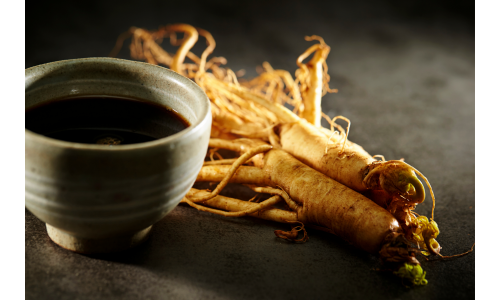
Also known as Korean Ginseng or Asian Ginseng, is a revered plant in traditional Chinese medicine. Its use can be traced back over 2,000 years, making it one of the oldest and most well-known herbal remedies. Its name, “Panax,” comes from the Greek word “Panacea,” meaning “cure-all,” indicative of its wide-ranging purported benefits. In Chinese, Ginseng is referred to as Ren Shen, which literally translates into Man Root.
Like Ashwagandha and Bacopa, Panax Ginseng has been extensively researched in modern science, with numerous studies confirming many of its traditional uses. A study published in the Annals of Pharmacotherapy in 2002 suggested that Panax ginseng may boost energy. Participants who took Panax ginseng daily for 8 weeks reported improvements in energy levels and overall well-being.
So, unlike Bacopa, which is renowned for its memory-enhancing abilities, and Ashwagandha, known for its stress-reducing effects, Panax Ginseng is often celebrated for its potent energy-boosting and immune-enhancing qualities.
Let’s delve into some of the key benefits of Panax Ginseng:
Energy Boost: One of the primary uses of Panax Ginseng is to boost energy. Many people turn to it to combat fatigue and improve physical performance.
Cognitive Function: Panax Ginseng can help enhance cognitive function, improving mental performance and attention span.
Immune Support: It has been found to have immune-enhancing properties, helping to strengthen the body’s defense system.
Blood Sugar Regulation: Some research suggests that Panax Ginseng may help manage blood sugar levels, making it potentially beneficial for those with diabetes.
Mood Enhancement: Regular use of Panax Ginseng can promote mental wellbeing, helping to reduce stress and elevate mood.
In comparison to other adaptogens like Ashwagandha and Bacopa, Panax Ginseng offers a unique blend of energy enhancement, cognitive support, and immune-boosting properties. This makes it a valuable addition to the adaptogenic family, offering distinct benefits depending on individual needs.
Rhodiola Rosea

Rhodiola Rosea, sometimes referred to as “golden root” or “arctic root,” is a plant that is native to the cold, mountainous regions of Europe and Asia. Its root is known to contain more than 140 active ingredients and has been used in traditional medicine for centuries, particularly in Russia and Scandinavian countries, to boost physical endurance, work productivity, longevity, and resistance to high altitude sickness.
Unlike Ashwagandha, which is celebrated for its stress-reducing properties, or Bacopa, known for its memory-enhancing abilities, Rhodiola shines when it comes to fighting fatigue and enhancing physical and mental performance. A study published in Phytomedicine in 2000 demonstrated that Rhodiola rosea can help fight fatigue and improve mental performance. Participants given Rhodiola rosea showed significant improvements in physical fitness, mental fatigue, and neuro-motoric tests compared to those given a placebo.
Let’s take a closer look at some of the key benefits of Rhodiola Rosea:
Fatigue Fighter: Rhodiola is perhaps best known for its ability to help the body adapt to and resist physical and mental fatigue. It increases the body’s resistance to stress, allowing for increased stamina and focus.
Enhances Mental Performance: Rhodiola can help improve cognitive functions, particularly in terms of concentration and memory. It’s a popular choice among students and professionals alike.
Physical Performance Booster: Rhodiola has been shown to improve physical performance and reduce exercise-induced fatigue, making it a favorite among athletes.
Mood Enhancer: Regular use of Rhodiola can help elevate mood and alleviate symptoms of stress and depression.
Comparing Rhodiola Rosea to other adaptogens, it’s clear that each has its unique strengths, and Rhodiola is no exception. It has a niche in combating fatigue and enhancing both physical and mental performance, thereby offering a unique blend of benefits among the adaptogenic family.
To see a full article on Rhodiola CLICK HERE!
Brain Gains: The Best Nootropic Supplements for Peak Performance 
Mushroom Adaptogens
This category represents adaptogens sourced from certain types of mushrooms. These fungi are chock-full of bioactive compounds that assist the body in combatting stress. Some notable examples are:
Reishi Mushrooms

Also known as “Lingzhi” in Chinese, is a type of mushroom that has been a cornerstone in traditional Chinese medicine for more than 2,000 years. It’s often called the “mushroom of immortality” due to its perceived health benefits and longevity-enhancing properties.
Similar to plant adaptogens like Ashwagandha, Bacopa, Panax Ginseng, and Rhodiola Rosea, Reishi has been the subject of many scientific studies that confirm its adaptogenic properties. Unlike these adaptogenic herbs, though, Reishi’s primary claim to fame lies in its potential immune-boosting and anti-aging properties, alongside its ability to promote relaxation and better sleep. A 2017 research study found that Reishi mushrooms (Ganoderma lucidum) could support the immune system and potentially have anti-aging effects. The study showed that Reishi could modulate immune cell functions and gut microbiota composition, and thus enhance the host’s immune system.
Here’s a glimpse into some key benefits of Reishi:
Immune Support: Reishi is renowned for its potential to support and balance the immune system. It’s believed to help increase the activity of white blood cells, which are crucial for immune health.
Stress Reduction and Sleep Aid: Reishi has been shown to help reduce stress and improve sleep quality, making it a popular choice for those struggling with insomnia or high stress levels.
Longevity and Anti-Aging: Traditional belief and emerging research suggest that Reishi may have anti-aging properties and could potentially enhance longevity.
Heart Health: Some studies suggest that Reishi can improve blood circulation and lower cholesterol, supporting overall heart health.
Compared to plant adaptogens, Reishi brings a unique blend of immune support, stress reduction, and potential longevity-enhancing benefits. As a mushroom adaptogen, it stands apart with its unique array of bioactive compounds and versatile health benefits.
Lions Mane

Lion’s Mane, or Hericium Erinaceus, is a type of mushroom recognized for its distinct shaggy appearance that resembles a lion’s mane. This mushroom has been utilized in traditional Chinese medicine for centuries and is revered for its potential to enhance cognitive function and nerve health.
Like Reishi and other plant-based adaptogens, Lion’s Mane is backed by numerous scientific studies that highlight its health benefits. While other adaptogens may focus more on stress resistance or immune support, Lion’s Mane stands out for its specific neuroprotective properties.
A 2009 study showed that Lion’s Mane had beneficial effects on cognitive function. The participants were older adults with mild cognitive impairment, and they consumed Lion’s Mane for 16 weeks. The study found that the Lion’s Mane group showed significantly increased scores on the cognitive function scale compared with the placebo group.
Let’s delve into the main benefits of Lion’s Mane:
Cognitive Enhancement: Lion’s Mane is often used to improve cognitive function, including memory, focus, and creativity. This makes it a popular choice among students and professionals alike.
Neuroprotective: Lion’s Mane has been studied for its potential to stimulate nerve growth factor production, which could slow cognitive decline and aid in nerve injury recovery.
Mood Enhancement: Regular consumption of Lion’s Mane has been associated with improved mood and reduced anxiety and depression symptoms.
Immune Support: Like other mushrooms, Lion’s Mane contains beta-glucans which are known for their immune-boosting properties.
Comparing Lion’s Mane to other adaptogens, it brings a unique blend of cognitive enhancement and neuroprotection to the table. As a mushroom adaptogen, it’s distinct from plant-based adaptogens and offers a diverse profile of bioactive compounds.
For the full article on Lion’s Mane, CLICK HERE!
Cordyceps
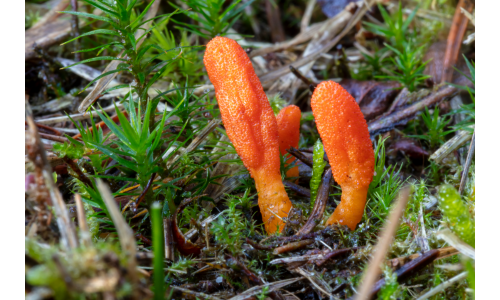
A genus of fungi that includes over 400 different species. The most well-known is Cordyceps Sinensis, which has been used in traditional Chinese and Tibetan medicine for centuries. This peculiar mushroom grows on the larvae of insects and has gained recognition for its potential to enhance physical performance and vitality.
Like other adaptogens such as Lion’s Mane, Reishi, Ashwagandha, Bacopa, Panax Ginseng, and Rhodiola Rosea, Cordyceps is backed by scientific research affirming its health-promoting properties. Cordyceps stands out among adaptogens for its unique focus on energy production and lung health.
A study published in the Journal of Alternative and Complementary Medicine in 2010 revealed that supplementation with Cordyceps Sinensis could improve exercise performance and contribute to overall markers of wellness in older adults. It’s suggested that the improvement in exercise performance may be due to the enhancement in the body’s bioenergetics (energy production) and lung health.
Here are some of the key benefits of Cordyceps:
Energy Booster: Cordyceps is often used by athletes due to its potential to increase energy levels. It’s believed to enhance the body’s production of the molecule ATP, which is essential for delivering energy to the muscles.
Exercise Performance: Studies suggest that Cordyceps can improve exercise performance and help fight fatigue, making it a favorite among active individuals.
Lung Health: Cordyceps has been traditionally used to improve respiratory health and is believed to have potential benefits for lung conditions like asthma and bronchitis.
Immune Support: Like other mushrooms, Cordyceps is rich in polysaccharides, known for their immune-boosting properties.
Comparing Cordyceps to other adaptogens, its specialty lies in energy production, exercise performance, and lung health. As a mushroom adaptogen, it offers a unique spectrum of health benefits distinct from plant-based adaptogens.
The Genius Mushroom
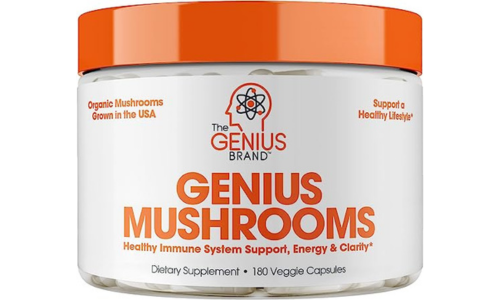
This Genius Brand mushroom blend truly lives up to its name, offering a smartly crafted formula of Lion’s Mane, Reishi, and Cordyceps mushrooms. Everything we just talked about! It’s a trio of superstars: Lion’s Mane for cognitive enhancement, Reishi for both immune system support and stress relief, and Cordyceps for energy and performance. All ingredients are in equal proportions, ensuring a balanced approach to boosting your brain health, managing stress, and improving vitality.
Synthetic Adaptogens
The least common of the categories, synthetic adaptogens are man-made substances designed to mimic the effects of natural adaptogens. Though they require further study to fully understand their safety and effectiveness, one primary example is:
Bromantane
Bromantane is not that easy to come by due to its unregulated status. I did find it on Amazon listed as a “research product”.

Also known as Ladasten, is a synthetic actoprotector developed in Russia in the late 1980s. Unlike the plant and mushroom-based adaptogens we’ve explored so far, Bromantane is a man-made compound. It’s designed to improve physical and mental performance, especially under stress conditions. Historically, it has been suggested that bromantane was provided to Russian soldiers, particularly during the Afghanistan conflict, to increase their endurance and resistance to fatigue. Also, Bromantane, It’s a no-go for athletes – the World Anti-Doping Agency (WADA) banned it back in ’97. Crazy, right? It ramps up dopamine and norepinephrine production, the stuff in our brains behind mood, motivation, and focus. It’s said to improve mental and physical performance.
A 1983 study in the Pharmaceutical Chemistry Journal showed Bromantane’s potential for enhancing physical performance. In the study, animals treated with Bromantane showed a significant increase in physical work capacity compared to controls, suggesting its efficacy as a performance-enhancing compound in humans.
Key benefits of Bromantane include:
Performance Enhancement: Bromantane is primarily known for its ability to enhance both physical and mental performance, making it popular among athletes and individuals in high-stress environments.
Reduction of Anxiety and Depression: Studies have indicated that Bromantane may have anxiolytic and antidepressant properties, helping to improve mood and resilience to stress.
Improvement in Learning and Memory: Preliminary research suggests Bromantane may have nootropic properties, potentially improving cognitive function, memory, and focus.
Compared to other adaptogens, Bromantane stands out as a synthetic compound specifically designed to enhance performance and resilience. Despite its different origin, it serves a similar purpose in helping the body adapt to stress and perform at its peak.
How do Adaptogens Effect Our Stress Hormone Cortisol?
So, when you’re stressed, your body responds by releasing a hormone called cortisol. It’s a crucial part of your body’s “fight or flight” response, but when it’s constantly high due to chronic stress, it can lead to some serious health issues like weight gain, sleep problems, and even a weaker immune system.
This is where adaptogens step in. Adaptogens are unique because they’re able to help balance the body’s stress response and bring those cortisol levels back to a more normal range. They don’t just suppress cortisol; instead, they work with your body to adjust its stress response, whether it needs to be dialed up or down. This is what makes them “adaptogens” – they adapt to your body’s specific needs.
Studies have shown that some adaptogens, like Ashwagandha and Rhodiola Rosea, can significantly reduce cortisol levels and improve stress-related symptoms. But as always, it’s important to chat with a healthcare provider before starting any new supplement regimen.
Full Article on all Stress Hormones: Decoding Stress Hormones: A Deep Dive into Your Body’s Alarm System
A Scientific Breakdown Made Simple
Adaptogens are like your body’s stress managers. Just like a manager at work can help you deal with a heavy workload, adaptogens help your body handle stress.
The hypothalamic-pituitary-adrenal (HPA) axis and the sympathoadrenal system are like your body’s stress response team. When you’re stressed, your body sends a signal (like a distress call) through this team to get the help it needs. The HPA axis and sympathoadrenal system respond by sending out stress hormones, like cortisol, which help your body react to stress.
Adaptogens act like a wise team leader. They help regulate or “modulate” the amount of stress hormones being released. If too many stress hormones are being sent out, adaptogens can help reduce the amount, preventing your body from getting too worked up. On the other hand, if not enough stress hormones are being sent out, adaptogens can help increase the amount, ensuring your body can effectively respond to the stress.
Adaptogens can also increase your body’s “sensitivity” to stress hormones. This doesn’t mean they make you more stressed. Instead, it means they help your body’s cells better recognize and respond to these hormones. Just like turning up the volume on a radio can help you better hear a song, increasing cellular sensitivity helps your cells better “hear” the signals being sent by stress hormones.
Now, let’s use an analogy:

Imagine you’re at a concert. The band is the stressor, the music is the stress hormone, and the concert’s sound engineer is the adaptogen.
When the band starts playing too loudly (too much stress), the sound engineer can turn down the volume so the audience isn’t overwhelmed. This is like an adaptogen modulating the release of stress hormones when they get too high.
If the band is playing too softly (too little stress), the sound engineer can turn up the volume so the audience can hear the music. This is like an adaptogen helping increase the release of stress hormones when they’re too low.
Finally, if some people in the audience are having a hard time hearing the music (low cellular sensitivity to stress hormones), the sound engineer can adjust the speakers’ position or increase their power so the music reaches everyone. This is like an adaptogen enhancing the body’s cellular sensitivity to stress hormones.
This way, just like a sound engineer ensures everyone enjoys the concert, an adaptogen ensures your body handles stress effectively.
From a scientific perspective, adaptogens interact with the hypothalamic-pituitary-adrenal (HPA) axis and the sympathoadrenal system, both of which are involved in the body’s response to stress. Adaptogens may help balance cortisol levels by normalizing the functions of these systems. They help modulate the release of stress hormones from the adrenal glands and support the body’s cellular sensitivity to these hormones.
In short, adaptogens are like your body’s stress thermostat. They don’t just turn the heat off – they adjust it to the right temperature for your body, helping to keep those stress hormones in check. Cool, right?
Conclusion
As we reach the end of this enlightening journey into the realm of adaptogens, it’s essential to emphasize that they aren’t magic bullets or cure-alls for our modern, stressful lives. They are, however, powerful allies in our battle against chronic stress, acting as valuable supplements that lend a hand to our bodies’ own resilience mechanisms. Their unique ability to aid our bodies in ‘adapting’ to the often harsh realities of life should not be taken for granted or underestimated.
Remember, as potent as adaptogens can be, they work best as part of a broader approach to stress management that also includes a balanced diet, regular physical activity, adequate sleep, and mindfulness practices such as meditation or yoga. Integrating adaptogens into this balanced lifestyle can help us harmonize our bodies and minds, enabling us to meet life’s challenges with a more robust disposition.
FAQ’s
Q: What are adaptogens?
A: Adaptogens are a unique class of herbs used in traditional Chinese medicine and other forms of alternative medicine that help the human body adapt to stress. They balance, restore, and protect the human body by increasing the body’s ability to cope with external stressors and manage stress.
Q: How do adaptogens work?
A: Adaptogens work by modulating the stress response of our body. They have a stimulating effect on our central nervous system, helping it to cope with both acute stress and long-term stress. Adaptogens act on the hypothalamic pituitary adrenal axis and the sympathetic nervous system, increasing resistance to stress.
Q: How can adaptogens benefit my immune system?
A: Some adaptogens, like certain Ginseng-like herbs, can boost immunity by supporting immune function. They have been found to improve the body’s ability to fight off illness and infection, making them useful for complementary and integrative health practices.
Q: Can adaptogens help with fatigue?
A: Yes, some adaptogens are used to combat physical fatigue and chronic fatigue syndrome. Their energy metabolism boosting properties can help to improve your working capacity and alleviate feelings of tiredness and lethargy.
Q: Can I take adaptogens with prescription medications?
A: While adaptogens are natural herbal supplements, they can interact with prescription medications. Therefore, it’s best to consult with a healthcare provider before incorporating them into your routine.
Q: Do adaptogens have side effects?
A: Most adaptogens are considered safe for general use. However, as with any supplement, they can cause side effects in some people, especially when taken in large doses or for a long period. Some reported side effects include headaches, upset stomach, and sleep disturbances.
Q: Are adaptogens approved by the Food and Drug Administration?
A: The Food and Drug Administration (FDA) does not approve dietary supplements, including adaptogens. However, manufacturers are responsible for ensuring their products are safe and accurately labeled.
Q: How can adaptogens help with hormonal balance?
A: Adaptogens can influence the production and regulation of various stress hormones, helping to restore hormonal balance. This includes hormones produced by the adrenal gland, such as cortisol, which plays a crucial role in how our bodies manage stress.
Q: Can adaptogens lower blood pressure?
A: Some adaptogens, such as certain adaptogenic herbs, may help lower blood pressure in people with high blood pressure. However, more research is needed to determine their clinical efficacy.
Q: Is there scientific evidence to support the use of adaptogens?
A: Yes, there is a growing body of research, including animal studies and clinical trials in healthy subjects and burnout patients, indicating the stress-protective activity of adaptogens. However, as is often the case in complementary and integrative health approaches, more research is needed to understand their molecular mechanisms and active compounds fully.
